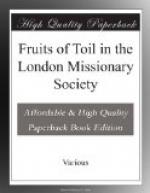The progress of the churches during the last eight years has been sound as well as rapid. Conviction has ripened where the good seed was sown; thousands have become members; many thousands more have joined our congregations; numerous churches have been organized both in the capital and in the country round. The members of the churches have been true missionaries where they have gone; and thus many, whom public duty or private interest had led far away from home, have been the means of planting churches in the district of Vonizongo, and even in the distant town of Fianarantsoa.
If the measure of our suffering be the measure of our greatness, we cannot wonder that this martyr church is strong in faith, giving glory to God. Hence all the quiet but solid strength of their present prosperity. Hence the great but not too rapid increase, in their numbers. Hence it is that, though persecution left them poor, they have built nearly a hundred village chapels; that their search into the Word of God is deep, continuous, and unwearied; that their congregations are crowded; that, at a missionary prayer meeting held early in the day, sixteen hundred persons gather together; and that, when a volunteer preacher finds it inconvenient every Sabbath to visit a distant village, his brethren invite him permanently to reside there, and offer to pay him a sufficient income till that village shall be christianized.
[Illustration: Ambatonakanga church, Madagascar.]
How shall we forget their grateful rejoicings when the first stone church in memory of their martyrs was set apart for worship! By the entire christian population, and even by many heathen, it was felt to be a truly festive day. From early dawn they began to gather around the edifice, eager to secure a place on an occasion so memorable. You see the little parties of christian villagers making their way across the western plain; coming in from the southward, where many churches lie; or from the north, where, in the sacred village of Ambohimanga, the man who should have been chief guardian of its heathenism, is now the teacher of its christian church. Streaming along the public roads of the city, the many processions, headed by their singers, mount to the noble platform of rock on which the Church of Ambatonakanga stands. The building will hold eleven hundred people, but over four thousand have gathered around it: the doors are opened at eight; sixteen hundred manage to squeeze in, and the remainder wait in patience for five hours more, to get their turn in the afternoon service. Attended by a procession, duly marshalled with music, high officers of the government bear from the Queen a condescending message of congratulation and encouragement. And then the native pastor opens the service. He is one of the earliest Christians in the island; a man of great ability, of noble, long-tried character. He was a convert in the old chapel that stood on that very ground.




